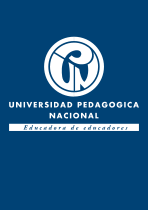Derecho a la ciudad, urbanismo unitario y vida digna : hacia la transformación de lo urbano.

Citación
Fecha
2021-01-01Autor
Navarro Martínez, Juan José
Enlace al recurso
https://revistas.pedagogica.edu.co/index.php/RF/article/view/11399Keyword
Right to the cityUnitary urbanismo
Decent life
Urban space
Direito à cidade
Urbanismo unitário
Vida decente
Espaço urbano
Metadatos
Mostrar el registro completo del ítemResumen
Las desigualdades de las ciudades latinoamericanas han configurado una estructura espacial compleja desde la cual se levantan resistencias hacia el Estado y el modelo neoliberal. Tanto movimientos sociales, como intelectuales y gobiernos locales han considerado como motor de cambio el denominado derecho a la ciudad. Este artículo de tipo reflexivo tiene como objetivo plantear puentes de conexión entre Lefebvre, la Internacional Situacionista y el movimiento de pobladores chileno, con la finalidad de vislumbrar cuáles son los factores fundamentales de la ciudad capitalista y su posible transformación. Para ello, se establecerán los elementos clave de cada una de estas fuentes para finalizar con una serie de consideraciones proyectivas a tomar en cuenta. En términos generales, existe una crítica hacia el accionar jerárquico en la construcción del espacio urbano, fragmentario y alienante, en conjunto con una disputa político social del territorio. Frente a la ciudad de los expertos y tecnócratas, se encuentran los vínculos orgánicos y solidarios.
Abstract
The inequalities of Latin American cities have shaped a complex spatial structure from which resistance to the State and the neoliberal model are raised. Both social movements, intellectuals and local governments have considered the so-called right to the city as the engine of change. This reflexive article aims to establish bridges of connection between Lefebvre, the Situationist International and the Chilean population movement, in order to dazzle what are the fundamental factors of the capitalist city and its possible transformation. To do this, the key elements of each of these sources will be established toend with a series of projective considerations to be taken into account. In general terms, there is a critique of hierarchical actions in the construction of urban, fragmentary and alienating space, together with a social political dispute of the territory.Facing the city of experts and technocrats, there are the organic and solidary bonds.
Editorial
Editorial Universidad Pedagógica Nacional
Fuente
Colecciones
- Revista Folios [571]
